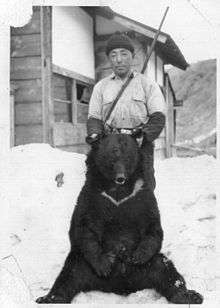Matagi

The Matagi (Japanese: 又鬼) are traditional winter hunters of the Tōhoku region of northern Japan, most famously today in the Shirakami-Sanchi forest between Akita and Aomori. They hunt deer and bear, and their culture has much in common with the bear cult of the Ainu. They live in small hamlets of the mountain beech forests of Tōhoku and engage in agriculture during the planting and harvest season. In the winter and early spring, they form hunting bands that spend weeks at a time in the forest. With the introduction of guns in the 20th century, the need for group hunting for bear has diminished, leading to a decline in Matagi culture.
Matagi hamlets are found in the districts of Nishitsugaru and Nakatsugaru (Aomori), Kitaakita and Senboku (Akita), Waga (Iwate), Nishiokitama and Tsuruoka (Yamagata), Murakami and Nakauonuma (Niigata and Nagano).
The Matagi are attested from the Medieval period, but continue to hunt today. They have come into conflict with environmentalists now that the forest has been partly cleared.[1] They no longer hunt the serow, which is protected, but continue to hunt bear. Matagi hunt by special license.
Specialized Matagi hunting vocabulary contains Ainu words.[2][3] Indeed, the word matagi itself may be Ainu, from matangi or matangitono "man of winter, hunter".[4]
Literary References
Matagi are referenced and described in the biographical novel Dog Man: An Uncommon Life on a Faraway Mountain by Martha Sherrill, alongside descriptions of a real modern day matagi named Uesugi who was a friend of the main characters who helped preserve the Japanese Akita breed of dog, which they used extensively for hunting.
References
- ↑ "Matagi: Hunters as Intermediaries Between 'Wild' and 'Domestic.'" Scott Schnell, Japan Anthropology Workshop, March 14, 2010
- ↑ Kudō Masaki (1989:134). Jōsaku to emishi. Kōkogaku Library #51. New Science Press.
- ↑ Tanigawa, Ken'ichi (1980:324–325). Collected works, vol. 1.
- ↑ mata 'winter', tono 'leader'